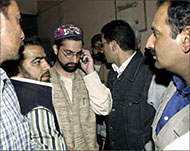Hopes fade for fresh Kashmir talks
Indian efforts to seek a settlement on Kashmir by holding a dialogue with separatists in the disputed Himalayan region may prove fruitless.

The moderate faction of Kashmir’s main separatist alliance – the Hurriyat Conference (HC) – said on Monday it was unwilling to continue talks with New Delhi.
The HC took exception to the Indian interior minister’s declaration that talks ought to be held within the parameters of the Indian Constitution.
Despite two rounds of talks with the previous Indian federal government, an HC spokesman said there would be no more dialogue because the minister’s condition was “unacceptable and unworkable”.
The third round of talks was scheduled to take place in June, but was delayed due to India’s general elections.
|
“We are of the firm opinion that issues can be resolved through talks alone. But the talks must be meaningful, result-oriented and unconditional” Hurriyat Conference |
The HC says it is against any conditions before negotiations.
“We are of the firm opinion that issues can be resolved through talks alone. But the talks must be meaningful, result-oriented and unconditional,” it said, adding that it was on the basis of these principles that it had begun dialogue with the Indian government.
It added: “Those were unconditional talks and were held on a particular political level and, above all, only after the two sides accepted the reality that Kashmir should be resolved through talks between all relevant parties to the dispute.”
PM’s refusal
Indian Interior Minister Shivraj Patil said on Sunday that talks with the HC and other Kashmiri separatist groups had to be held “within the four walls of the constitution”.
India Prime Minister Dr Manmohan Singh had also rejected a demand that future talks should be held at the most senior levels only.
The HC said the earlier rounds of talks were held on the “highest-level” with the previous Indian government.
Visit to Pakistan
Elaborating, Kashmir’s chief Muslim cleric and acting chairman of the HC, Mirwaiz Umar Faruq, said the previous Indian government had agreed that after the third round of talks Faruq and his comrades in the alliance should be permitted to visit Pakistan.
 |
|
Faruq (C) wants India to keep its |
“We want to go there to hold talks with the Pakistani government, the Kashmiri political leadership and the mujahidin in Azad (free) Kashmir” he said.
Islamabad calls the Pakistan administered part of Kashmir Azad Kashmir.
The Mirwaiz’s advice to the new Indian government was “to accept the ground reality of Kashmir being a dispute between India, Pakistan and the people of the state and make an honest and serious effort towards resolving it amicably”.
He regretted that the statements emanating from Delhi were “quite irregular” and said the liberal United Progressive Alliance government headed by reformist Dr Singh was not clear in its outlook on Kashmir.
Split
The moderate faction of the HC is under sharp criticism by the hardliners who see its decision to hold a dialogue with the Indian government as a betrayal and deviation from a unanimous decision that Pakistan too should be involved.
The Hurriyat Conference, initially an alliance of more than two dozen political, religious and social organisations, split last year after hardliners led by former political chief of Jamaat-e-Islami, Sayyid Ali Shah Gilani, revolted against the decision to hold talks with New Delhi.
It is this hardline faction of the alliance that is now calling the shots. Most fighting groups have endorsed its stance and are openly censuring the Mirwaiz and his comrades.
Kashmir watchers believe the moderate faction of the HC was looking out for an excuse to walk out of the talks for a long time.
But the Mirwaiz denies it has called it a day. “We haven’t withdrawn as such but we should not be expected to hold dialogue within the framework of Indian Constitution as Mr Patil wants to,” he said.